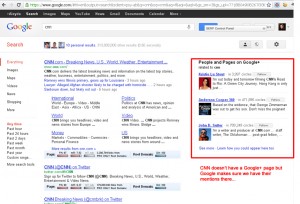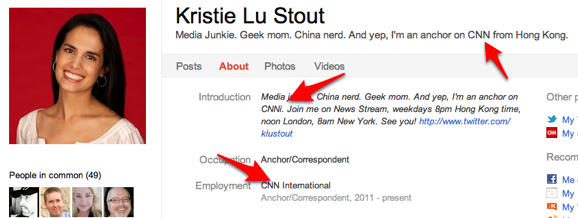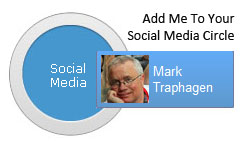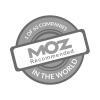UPDATE: The beginning of this post talks about a Google search feature which no longer exists: the “People and Pages on Google+” box. For a period of time Google displayed this box for certain search queries, showing the top-ranked people or brand Pages from Google+. Even though this no longer appears in search, I believe that what it demonstrated is still in play: that Google ranks users and Pages in Google+ search largely by keywords that appear in their Google+ profiles.
Take a look at the screen capture by Aleyda Solis below. She noticed that even though CNN had no Google+ page at the time, they got a Google+ spot in the search results for “CNN” through the “People and Pages” box. (Click image to enlarge and increase clarity)
Why is Kristie Lu Stout showing in the Google+ People and Pages box for a search for CNN? Very simple.
Want to rank for a term in Google+ search?
Have the term on the About tab of your Google+ profile. At least right now this is more important than post relevancy. I’ve ranked myself high in Google+ search for several terms that I never, ever mention in any of my public posts. The only place those terms appear associated with me is on my profile page.
I’ll go back to my classic example of how a keyword on a Google+ profile page plus an influential presence on G+ is all you need to rank for a term in G+ search.

About a month ago I did an incognito search for “google+” and was surprised to find that one of the top ranking people at that time was celebrity +David Beckham. I was a bit incensed to find that he outranked me for the term, and I post a lot about G+. I looked as far back in his posts as I could, and never once did I find a single mention of “google+”
But…his profile intro contained just one sentence: “The official Google+ profile of David Beckham.” There could be only one conclusion: Beckham was in the top 10 for Google+ solely because he had the keyword in a very popular profile.
(Due, I think, to the rapid growth and influence of my Google+ profile and the fact that I post and get engagement regularly about Google+, I’ve since outranked David Beckham for the term “google+” Now if Google could make me look as good in a Speedo as he does, I’d sell them my soul!)
Does This Affect Regular Google Search?
Over a year ago Google filed a patent for something they called “Agent Rank.” The patent describes agent rank as a method whereby Google can verify the identity of certain “entities” and then establish trust measures for topics in content by those entities. When shortly thereafter Google rolled out it author rich snippet results program, many in the SEO community were sure this was the first example of Agent Rank, and they dubbed this aspect Author Rank. The program allows web content creators to establish a verified link between their original content and their Google+ profiles. (Find out how to become a Google verified author.)
Back in July 2011 Google said that this author verification linking would be used “at some point” to influence search rankings. Ever since then experts in the SEO community have argued about whether the “juice” had been turned on yet. I’m among those who is convinced that it is at least being tested. And I think it is the final link that has made my Google+ profile so powerful, able to outrank many profiles with far more followers. For an example of why I think Author Rank is a contributing factor to ranking high for Google+ posts, see “How I Outranked Social Media Rockstar Mari Smith for Her Own Post.”
So the more AuthorRank comes into play as a Google ranking factor, the more important what your Google+ profile is able to rank for. These things will probably serve as a guide to Google for main topic areas for which you should have an Authorship score.
Action Steps
Is it important to you to be able to rank high in Google search for certain terms? Do the following without delay, if you haven’t already.
- Ignore all the “Google+ is a ghost town” news stories. They don’t know what they are talking about because they’ve failed to understand that Google didn’t create Google+ to be another Facebook. They made it to make the world’s most powerful search engine magnitudes more powerful.
- Create an optimized Google+ profile. Decide what keywords you want to rank for and include them in your profile’s “about” tab. Don’t keyword stuff; keep it natural. Remember that your profile not only has to emphasize your keywords, it has to sell you as being worth following. Use my Guide to Optimizing Your Google+ Brand Page for guidelines. Even though that’s about Pages, not personal profiles, many of the principles will apply.
- Post regularly and creatively about your keyword topics. Even though I’ve shown that it is not absolutely necessary to post about the keyword to rank for it, I would still be relevant in as many of your posts as you can. I suspect that as this thing grows, at some point Google will tighten their algorithms for internal Google+ search to make post relevancy a bigger factor. When that happens, you want to be ready with a good history of posting on topic.
- Build the influence of your Google+ profile. How to do that is beyond the scope of this post, but the usual social media influence principles apply. Don’t spam, follow other influencers, contribute to their comment threads, be helpful, be interesting, etc. Promote your profile everywhere with badges and links.
- Link your web content to your Google+ profile to begin to build Author Rank with Google.
li
Related articles
- The SEO Power of Google+ Plus Google Author Rank (virante.com)
- Does Social Media Improve Google Organic Search Ranking? (pamorama.net)












